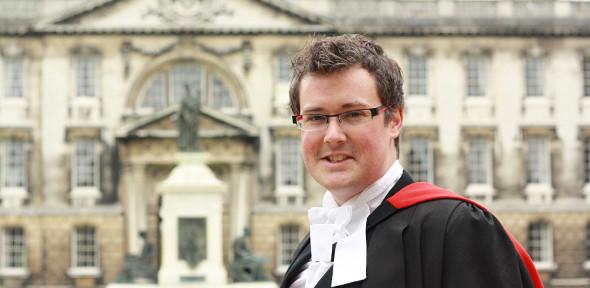
Dr Mark Ainslie, a member of the Bulk Superconductivity Group and a Fellow at King's College, has been awarded a Royal Academy of Engineering Fellowship for the period 2012-2017, to pursue research into "Engineering Interactions of Magnetic and Superconducting Materials for Electrical Applications."
I am extremely grateful for the support from the Royal Academy of Engineering and the opportunity this presents to pursue my research on applications of high temperature superconductivity.
Dr Mark Ainslie
In developed industrialised nations, such as the UK and the US, the industrial sector uses about one third of energy consumed, and approximately two thirds of this energy is consumed by electric motors. One way to reduce electrical energy consumption in electrical machines is the construction of electric motors and generators with better efficiency. Loss of electrical energy due to resistance to current flow, which is prevalent in conventional machines, translates directly to wasted energy and, therefore, to wasted economic resources.
Superconductivity offers zero to near zero resistance to the flow of electrical current when cooled below a particular cryogenic temperature. Consequently, the use of superconducting materials can improve the overall electrical system efficiency, and in addition, superconducting materials are able to carry much larger current densities than conventional materials such as copper. In electric machines, in particular, increasing the current and/or magnetic flux density increases the power density, which leads to reductions in both size and weight of machine. The expected improved performance and efficiency, as well as smaller footprint, in comparison with conventional devices has seen continued interest in introducing superconducting materials to not only electric machines, but also to other electric power applications, such as transformers and cables.
The Bulk Superconductivity Group produces some of the highest quality bulk superconductors in the world and it is only in recent years that long lengths of high quality tape superconductors have been available for meaningful practical applications. Research carried out to date on the electromagnetic properties of superconductors operating within complex geometries has produced a number of interesting results; in particular, how the use of hybrid combinations of magnetic materials and superconductors can affect the superconductor's electromagnetic properties. There is significant promise for magnetic materials to be used together with superconducting materials to further enhance the remarkable properties of these materials, and indeed a great deal of research has been carried out at the nanoscale level by Materials Scientists. However, there is a lack of such research on a macro-scale/engineering level, such as the reduction of AC loss in coils made from superconducting tape, which can be problematic in applications where a time-varying current and/or magnetic field is present, and shaping and enhancing the trapped magnetic field in bulk superconductors.
Mark's proposal aims to address engineering interactions of magnetic and superconducting materials in both tape and bulk forms in order to better design and improve the performance of applications of superconductivity for electric power systems. The results of preliminary investigations will be applied to an electric machine design, in order to produce a prototype design of an optimised superconducting electric machine with reduced AC loss (which means higher efficiency), high torque, and reduced weight and size.

